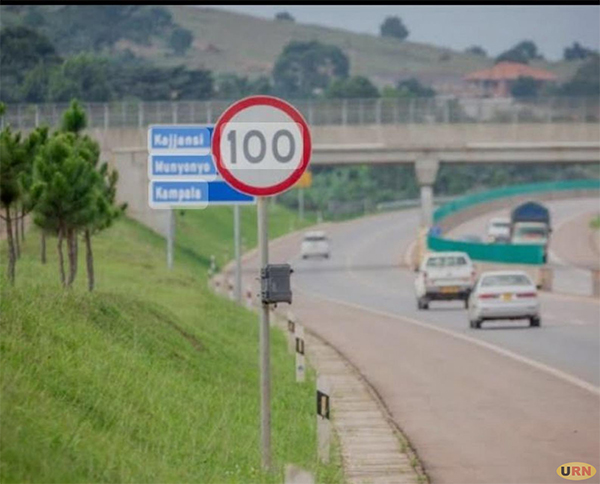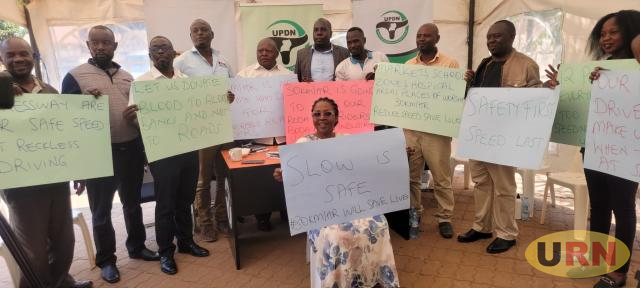
Speed on all roads adjacent to a school, church, hospital, market or business centre high human or vehicular interaction, is now limited to 30Kph.


Kampala, Uganda | THE INDEPENDENT & URN | The Traffic & Road Safety (Speed Limit) Regulations 2024 are now in full force, the Ministry of Works and Transport has confirmed today.
The regulations introduced to the public and gazetted in February, see a reduction in speed limits in redefined “urban centres” and subsequently an increase in the maximum penalties from sh200,000 to sh600,00 for any person who exceeds the speed limit.
“So if you’re flying at 100km/h on Northern Bypass (limit: 70km/h) or above 60km/h on Lugogo Bypass (limit: 30km/h)… that’s 30 currency points out of your wallet—not the old 10! Let’s keep the roads safe—and your money where it belongs,” the Ministry said in a statement today.
Signed late last year by the Minister of Works and Transport Gen Katumba Wamala, the regulations see a reduction of speed limits from 50Kph to 30Kph for urban areas.
Urban areas have also been redefined. Speed on all roads adjacent to a school, church, hospital, market or business centre high human or vehicular interaction, is now limited to 30Kph. This categorization was not there before, but was introduced in the new regulations.
The speed limits for all major highways having single carriageways have equally been lowered to below 100km/hr with only Dual carriageways now left with a maximum speed of 100km/hr.
“The changes also come on a backdrop that the previous regulations did not provide for specific traffic speed limits for specific zones especially busy centres, thereby exposing pedestrian traffic to accident risks,” an official at the Ministry Of Works said.
The last changes to speed laws were last done 20 years ago, the Uganda’s Speed Limit Regulations 2004 that replaced those of 1972.
The Traffic & Road Safety (Speed Limit) Regulations 2024 are now officially in force!
Here’s what you NEED to know:
Exceed the speed limit by 10–30km/h? That’ll cost you UGX 200,000.
Go over by 30km/h or more? Get ready to cough up UGX 600,000!
So if you’re flying at… pic.twitter.com/JlC6B1sp7K
— Ministry of Works & Transport (@MoWT_Uganda) April 23, 2025
The 2004 Regulations prescribed a general Speed Limit of 50kph for Urban Areas, Trading Centres and built-up areas for all types of motor vehicles.
“Any person who exceeds a speed limit specified in the first and second schedule of these regulations commits an offence and is liable, on conviction, to a fine not less than five currency points and not exceeding ten currency points or imprisonment not exceeding one year, or both,” stated the 2004 regulations.
The Speed Limit Regulations of 2024, that were published in the Gazette in February, focus on express penalties for offences.
“A person who contravenes any provision in these Regulations shall pay an express penalty in accordance with the Traffic and Road Safety (Express Penalty Scheme for Road Traffic Offenders) Regulations, 2024. (2) The express penalty referred to under sub-regulation (1) shall be— (a) ten currency points in excess of one to thirty kilometres per hour; or (b) thirty currency points in excess of over thirty kilometres per.”
MOWT’s regulations also limit speed on rural roads for passenger vehicles. For instance, passenger vehicles moving on paved roads have been limited to 90km/hr, 60km/hr on gravel roads and 30km/hr on community access roads.
Motorcycles, tricycles and quadricycle on paved roads have been restricted to 60km/hr, 30km/hr on gravel roads and 30km/hr in urban centres.
The public service vehicles and private omnibuses with seating accommodation of eight persons in addition to the driver’s seat have been limited to 80km/hr on paved roads, 60km/hr on gravel roads and 30km/hr in urban and built-up areas.
“The main causes of road crashes 44.5% are careless overtaking and speeding. These regulations are in place to ensure that we deal with the main causes of crashes on Ugandan roads. Please slow down and let’s save lives,” MOWT officials said on X.

Road safety experts support new regulations
Road safety experts have urged Ugandans to respect the newly gazetted speed limits to reduce carnage.
Traffic police statistics for 2024 show 5,144 Ugandans died in traffic accidents which translates to 14 deaths per day. This has been a gradual increase in road deaths in the last five years and there are no signs that this trend will reduce sooner.
Road Safety Advocacy Coalition Uganda (ROSACU) in collaboration with Global Health Advocacy Incubator (GHAI) have called upon all Ugandans to respect the new speed limits.
Ndugu Omongo, a road safety expert and executive Director of Uganda Professional Drivers Network (UPDN) said the skyrocketing road fatalities can be reduced this year if Ugandans abide by the new speed limits for urban and rural roads as well as the highways.
Omong said Ugandans have often blamed road crashes on infrastructural design and some claim the roads are narrow as causes of traffic accidents which is not true.
According to Omongo, all studies done by various local and international organizations such as the World Health Organization (WHO) have mentioned speeding, driving under the influence of alcohol, not wearing seatbelts, not wearing crash helmets and lack of child restraints as the major causes of road fatalities.
Maria Nkalubo, GHAI’s In-Country Coordinator, has extolled MoWT in collaboration with UPDN, Safe Transport and Survivors Support Uganda (STASSU) and Centre for Policy Analysis (CEPA) to incorporate an aspect that allows local governments to set up speed limits as they deem it necessary.
Uganda Local Government Association (ULGA) has also welcomed the new speed limit regulations for empowering them to set speed limits. Richard Okuku, ULGA Secretary General, said they now have the opportunity to modify (lower) speed limits within their district urban community access roads in Uganda. This will be done by applying to the Minister for Works and Transport which was not provided for in the 2004 regulations.
Isaac Kataabu, a Director at UPDN and Percy Mulamba, a road safety expert at Consult Africa Usalama, have applauded UPDN, STASSU and CEPA as well as GHAI, the funder for supporting MoWT in the development of speed limits.
Road safety experts warned that it is the role of every road user to ensure that the new speed limit prescriptions are heeded. Kataabi emphasised that a driver should know that at any time of the day he or she is a pedestrian since vehicles cannot be taken inside shops, churches or markets.
*****
Selected Summary of speed limits



 The Independent Uganda: You get the Truth we Pay the Price
The Independent Uganda: You get the Truth we Pay the Price



 Who is Pope Leo XIV?
Who is Pope Leo XIV?